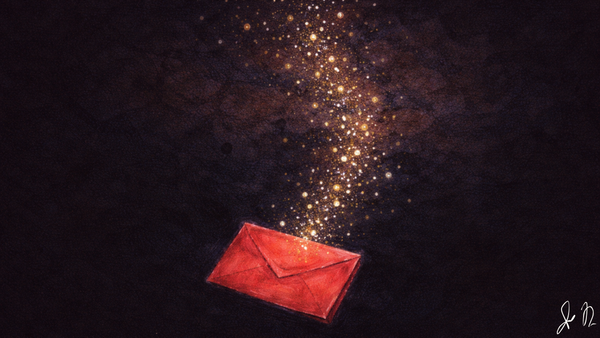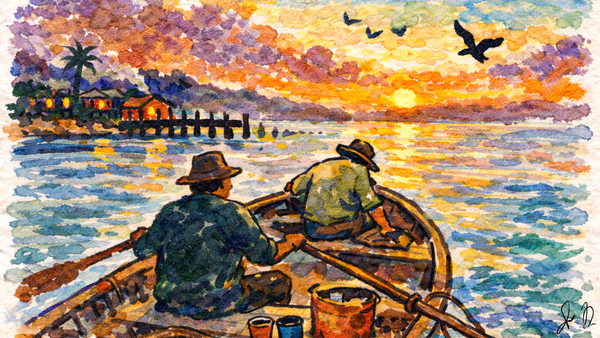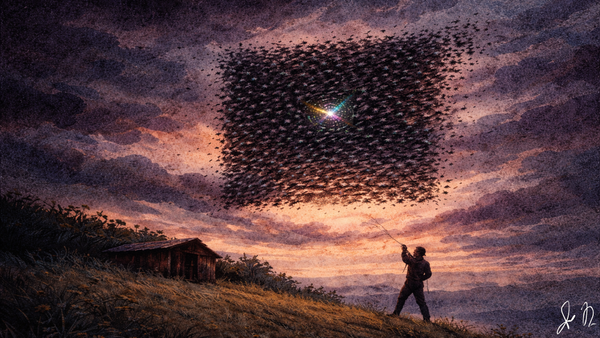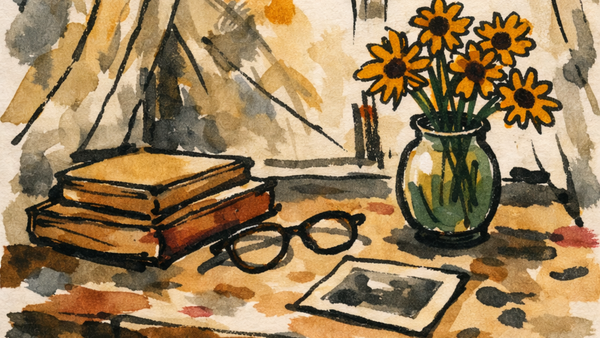I Am the Wolf, I Am the Boy
When someone loves him, he becomes a wolf. Then he forgets them forever.
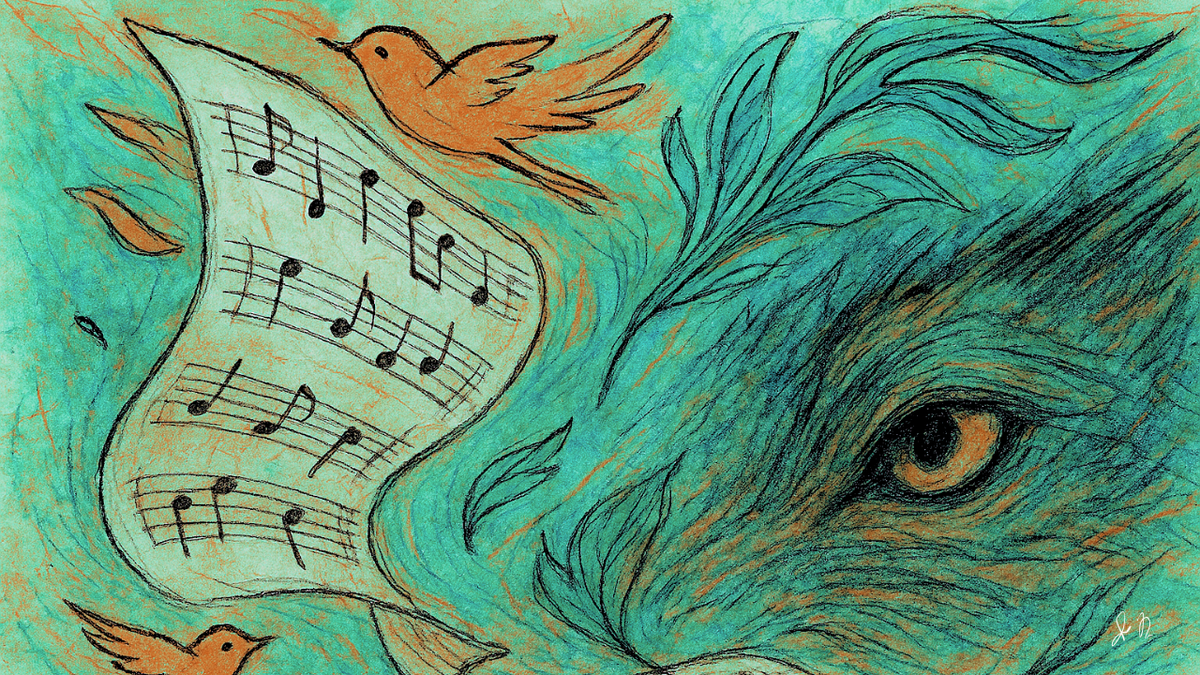
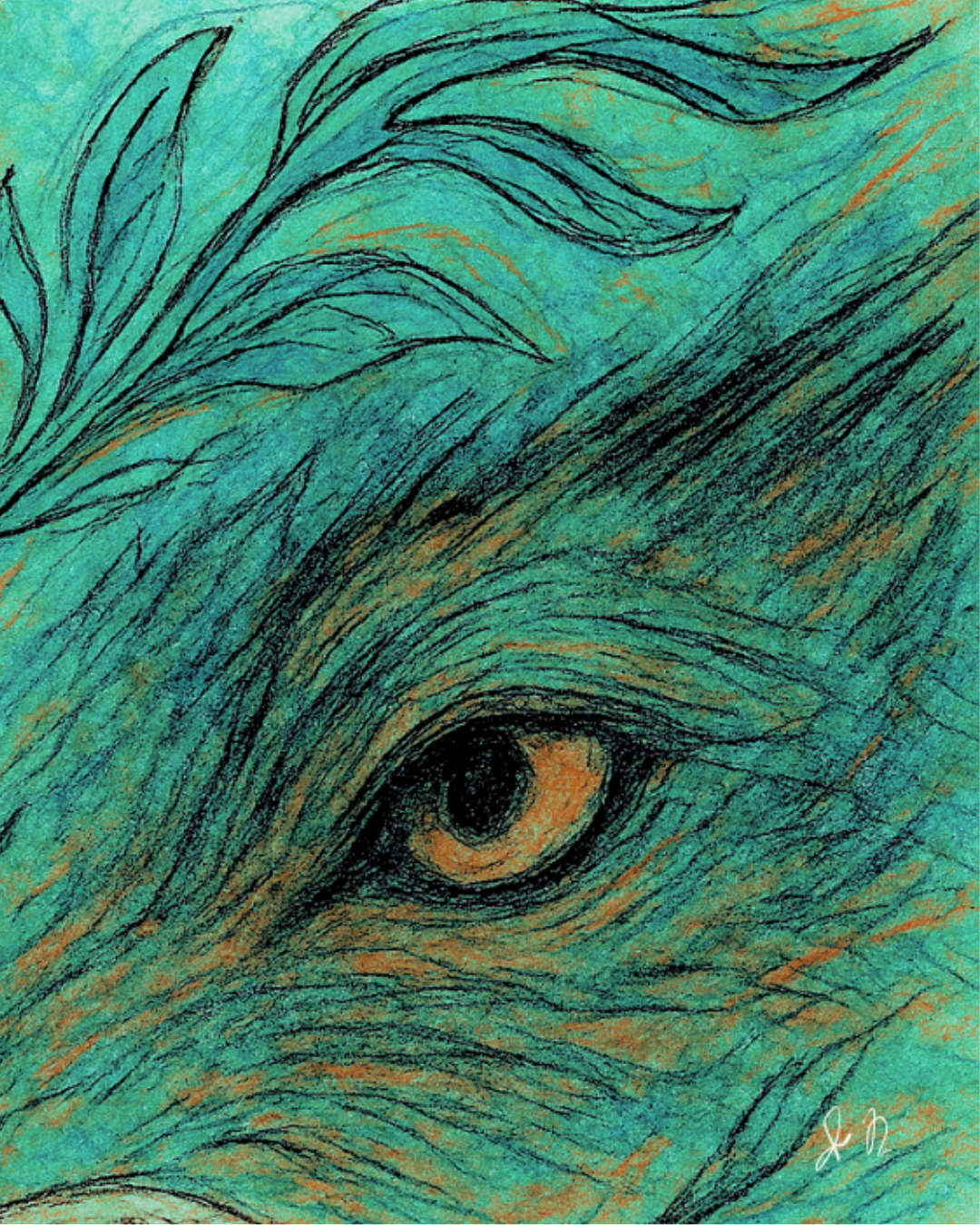
The Singing Woods had a reputation for swallowing bards whole. Not literally, though Ilen wouldn’t have been surprised if that were true too, but in the way that men who entered with songs in their throats came out silent, or not at all. The locals in the last village had tried to warn him off with their stories. Something about a wolf prince, about love that unmakes itself, about forgetting and being forgotten. Ilen had bought the drunkards another round and let them talk. He needed their stories more than their warnings.
Ilen’s lyre case knocked against his hip with each step, the instrument inside long past its best days. Like him. The path narrowed until it was barely a suggestion between the moss-thick trees, and the afternoon light came down green and strange through the canopy. He’d been walking for hours when he heard it. A sound close to singing, not quite humming. A voice that moved like water over stones.
The man sat on a fallen log, barefoot despite the October cold, peeling bark from a branch with his thumbnail. His hair was dark and needed cutting, and there was something about the way he held his shoulders that made Ilen think of a deer about to bolt.
“You’re looking for me,” the man said without looking up.
Ilen stopped. “Am I?”
“They always are. The ones who come this deep.” The man—barely more than a boy, really—finally raised his eyes. They were the color of wet earth. “Are you a bard?”
“Was.” Ilen set down his pack, tried to look less desperate than he felt. “These days I’m more of a collector. Stories, songs. The older the better.”
“And you heard about the wolf prince.” Not a question.
“Something like that.”
The man smiled, but it was all wrong, like he’d learned it from watching through windows. “I’m Corrin. You can stay for dinner if you want. But you should know—” He paused, went back to peeling bark. “Do not love me.”
Ilen almost laughed. The presumption of it. “Wasn’t planning on it.”
“Good. Because when people love me, I become something else. And when I become something else, I forget them.” Corrin stood, brushed bark from his trousers. They were patched at the knees with fabric that didn’t match. “There’s rabbit stew. It’s not very good, but it’s warm.”
The cottage was more of a lean-to that had gotten ambitious, built against a massive oak that seemed to be the only thing keeping it upright. Inside, herbs hung from every beam—some Ilen recognized, most he didn’t. The fireplace was just a ring of stones with a pot hanging over it, and the whole place smelled like smoke and perhaps flowers left too long in water.
“How long have you lived here?” Ilen asked, setting his lyre case carefully against the wall.
“Always, I think. Or long enough that it feels like always.” Corrin ladled stew into two wooden bowls. His hands were steady but his eyes kept flicking to the door, the window, anywhere but Ilen’s face. “You’re not the first to come looking for a story.”
“Did the others get one?”
“I don’t remember.”
They ate in silence. The stew was indeed not very good—too much salt, not enough meat—but Ilen had eaten far worse. He watched Corrin eat, noticed how he held his spoon incorrectly, and how he chewed like he was afraid of his own teeth.
“The villagers,” Ilen said finally, “they said something about you being forgetful. And earlier, you mentioned it to me as well.”
Corrin set down his bowl. “Yes. Well. When someone loves me…really loves me, not just wants something from me…I begin to change. The moon pulls it out of me, or maybe the love itself does, I don’t know which. I then become a wolf. And the wolf doesn’t remember what the boy knew.”
“That is…a cruel sort of curse.”
“Yes.”
“How many times?”
Corrin gave him a rigid look. There was something ancient in his young face. “I don’t know. How do you count fingers on a hand you cannot see or feel? I wake up sometimes and there are things…a ribbon tied to my wrist…a song stuck in my head that I know I didn’t write...all of it evidence of people I must have known once. Must have—” He stopped.
“Loved,” Ilen finished.
“Maybe. Or maybe they just loved me. It amounts to the same thing in the end.”
Outside, the sun had finished its setting, and the green light had gone gray. Ilen could feel the temperature dropping through the thin walls. “I had someone once. Arlin. He was killed in a tavern fight. Stupid thing…wasn’t even his fight. Two years ago now.”
“I’m sorry.”
“I’m not looking for love, either, Corrin. I’m only looking for a song worth singing again. That is all.”
Corrin studied him without blinking. “Please. Stay the night. The woods are dangerous in the dark, and not just because of me.”
They sat by the fire as darkness settled over the woods like a living thing. Ilen had brought out his lyre with no intention to play, but to clean and restring it. The familiar work kept his hands busy while Corrin fed the fire with branches that sparked blue and green in the flames.
“Chemical salts in the wood,” Corrin explained when Ilen looked questioning. “From the soil here. Everything in these woods is a little bit tainted.”
“Including you?”
“Especially me.”
Ilen plucked a string, testing its tension. The note rang out clear in the small space, and Corrin went very still.
“Play something,” he said, and it sounded like begging.
So Ilen played. Nothing special, just an old tune from the eastern provinces about a miller’s daughter and a river spirit. But when he looked up, Corrin’s eyes were closed and his lips were moving slightly, like he was trying to remember words to a prayer.
“I know this one,” Corrin whispered. “Someone sang this to me. They changed the words though. Made it about a baker’s son instead.” His eyes opened, focused on Ilen with a sudden intensity. “Was it you?”
“No. First time we’ve met.”
“You sure?”
Ilen was about to say yes when he really looked at Corrin’s face in the firelight. There was something in the way he tilted his head when he listened, the particular curve of his mouth when he was thinking. Familiar in a way that made no sense.
“Play another,” Corrin said.
This time Ilen played something Arlin had taught him, a drinking song that was probably older than both their grandfathers. Halfway through the second verse, Corrin started singing along. Not the common words everyone knew, but a variation Ilen had only heard once before. From Arlin himself.
He stopped playing. “Where did you learn that?”
“I don’t know. I just…I just know it.” Corrin pressed the heels of his hands against his eyes. “This happens sometimes. Songs I shouldn’t know, words in languages I don’t speak. Memories that aren’t mine. Or maybe they are and I just—”
He stood abruptly, paced to the window. Outside, the moon was rising, not quite full but close enough. Corrin’s hands were shaking.
“You should go,” he said. “Now, while you still can.”
“What’s happening?”
“The moon. And you—you’re looking at me like—” Corrin gripped the windowsill hard enough that Ilen heard the wood creak. “Please. Just go.”
But Ilen didn’t move, nor could he. Because Corrin’s shoulders were shifting under his shirt, and his breathing had gone ragged, and when he turned, his face was twisted with the effort of holding something back.
“I don’t want to forget you,” Corrin gasped. “Not you. It feels important that I don’t forget you.”
“Then don’t change.”
“It’s not—I can’t—if you keep looking at me like that—”
“Like what?”
“Like you could love me.”
Ilen set down his lyre and stood slowly. “I told you, I’m not looking for—”
“I know what you told me. But hearts do not listen to their minds, and the moon does not care about intentions.”
Corrin’s shape flickered in the firelight, for just a moment not quite human. Then he pressed his palms flat against the wall and breathed deep, and he was suddenly just a young man again. Just Corrin, barefoot and strange and terrified.
“Tell me something,” he said. “Something true. Something that might stick even if…when…give me something to hold onto.”
Ilen took a step closer, careful, like approaching a spooked animal. “My name is Ilen Blake. I’m twenty-four years old. I was born during a thunderstorm and my mother said it marked me for a loud life. I’ve been trying to prove her wrong ever since.” Another step. “I can’t sleep without something covering my feet. I despise the taste of honey. I’ve written almost a hundred songs and forgotten most of them.”
“Ilen,” Corrin repeated. “Ilen who hates honey. Ilen who covers his feet.” He turned from the window, and his eyes were bright with unshed tears. “I’m going to forget you.”
“Maybe not.”
“I always do.”
They stood there, three feet apart that might as well have been three hundred. The moon climbed higher. The fire popped and sent sparks up that died before they reached the herbs hanging from the rafters.
“One more song,” Corrin said finally. “Play me one more song before...before whatever happens happens.”
So Ilen played. This time he chose something wordless, a melody he’d been working on for months but could never quite finish. It was meant to be about loss, how the grief of it sits in your chest like a stone you carry everywhere. But as he played it now, watching Corrin’s face in the dying firelight, it became something new. Something in the space between what he wanted and what we could have. Reaching for something he knew would burn him.
When he finished, Corrin was crying silently, tears tracking down his face like rain on glass.
“That one,” he said. “If I remember anything, let it be that one.”
The moon was high now, streaming through the window. Corrin had moved as far from Ilen as the small room allowed, pressed into the corner by the door. But they were still talking, couldn’t seem to stop talking, like words were the only devices capable of penetrating the wall between them.
“Tell me about the others,” Ilen said. “The ones who loved you before.”
“I told you, I don’t remember—”
“But you know there were others. You have evidence.”
Corrin pulled something from his pocket. A length of blue ribbon, faded and frayed. “This was tied to my wrist two summers ago. Or maybe three. Time gets slippery when you’re always forgetting pieces of it.” He ran the ribbon through his fingers. “Sometimes I wake up and there’s food I don’t remember making. Books I don’t remember reading, marked at specific pages. Once there was a letter, but it was in a language I couldn’t read. I kept it anyway, until the rain got to it.”
“Do you think they come back? The people who loved you?”
“Would you?”
Ilen didn’t answer. The honest response terrified him.
Corrin must have seen it in his face because he laughed, bitter and broken. “I think you already have.”
“What?”
“The way you hold your lyre. The way you sit with your ankle crossed over your knee. The scar on your knuckle you keep rubbing when you’re thinking. It’s all familiar.” Corrin moved closer, just one step, but it felt momentous. “Ilen, I think I’ve forgotten you before.”
“That’s impossible.”
“Is it? You said you’ve been traveling for years. Where were you two winters ago?”
Ilen tried to remember. Two winters ago would have been—he frowned. There was a gap there, a month or two that felt fuzzy when he tried to focus on it. He remembered being in the capital before, and then suddenly it was spring and he was in a coastal town with sand in his boots and no memory of traveling there.
“I don’t—”
“What about the song you just played? The one you can’t finish? When did you start writing it?”
“Two winters ago,” Ilen whispered.
They stared at each other across the room that suddenly felt too small, too warm despite the dying fire.
“You came here before,” Corrin said with remarkable certainty. “You found me, and we—and then I changed, and forgot, and you left. But you came back.”
“I don’t remember.”
“Neither do I. But—”
“Stop.” Ilen’s hands were shaking. “Just stop.”
But Corrin kept going, relentless now. “The song Arlin taught you. What if it wasn’t Arlin? What if it was me, singing something I learned from someone else, someone before you, another link in this chain of forgetting?”
“Arlin is dead.”
“Are you sure? Or is that just easier than believing you left him here, in these woods, knowing he’d forget you the moment you walked away?”
Ilen wanted to deny it, but something inside him was pushing to get out. Arlin’s face in his memory—was it real or something he’d constructed to fill a gap? The tavern fight—he could picture it, but only the aftermath, never the fight itself. Corrin had said that he would forget those who loved him. But perhaps the curse also extended to the ones he loved back.
“Even if…even if that’s true,” Ilen said, “what does it change? You’ll still forget me when the sun rises.”
“Yes.” Corrin took another step closer. “And you said you’re not looking for love. But what if you already found it? What if you keep finding it and losing it and finding it again?”
“That would be a form of hell.”
“A hell that would be the only way we can have each other at all.”
The moon was so bright now it cast shadows sharp as knives across the floor. Corrin’s form was flickering more frequently, wolf and boy and a creature between.
“I should leave,” Ilen said desperately. “Right now. Before—”
“You probably should.” Corrin’s voice was rough, animal-close. “But you won’t.”
“How do you know?”
“I don’t, really.”
His words sounded like prophecy, or just another curse. Ilen wanted to reject the terrible possibility that this had all happened before, would happen again, an endless loop of finding and losing and forgetting.
“Is one night worth it?” he asked. “Is loving someone for a handful of hours worth losing them forever?”
Corrin smiled, sad and beautiful and doomed. “You tell me. You’re the one who keeps coming back.”
The decision, when Ilen made it, felt inevitable. Like every step through the woods had been leading him here, to this moment, to Corrin’s face in the moonlight and the terrible ache of recognition in Ilen’s chest.
He crossed the room in three strides and kissed him.
Corrin made a sound like breaking and kissed back, desperate, his hands fisting in Ilen’s shirt. He tasted like smoke and wild shrubs.
“I’m sorry,” Corrin gasped against his lips. “I’m so sorry, I tried to warn you—”
“I know.” Ilen held his face between his hands, memorizing the shape of it. “I know.”
The change started at Corrin’s fingertips. Ilen watched it happen, the skin sprouting fur, nails lengthening to claws, bones shifting under skin like water finding new channels. Corrin’s eyes went wide with panic.
“Your name,” he said urgently. “Tell me your name again.”
“Ilen. Ilen Blake.”
“Ilen.” Corrin’s voice was going rough, inhuman. “Ilen who hates honey. Ilen who…who…”
The wolf emerged like something tearing free from too-small clothing. One moment Corrin was there, human enough to hold, the next there was only the wolf, huge and dark, eyes gone yellow-wild. It looked at Ilen without recognition, lips pulled back from teeth that could tear out a throat.
“Corrin.” Ilen didn’t move, didn’t run, though every instinct screamed at him to. “It’s me. Please.”
The wolf tilted its head, considering. For a heartbeat, Ilen thought—hoped—but then it turned and crashed through the door, leaving it hanging broken on its hinges. He heard it running through the underbrush, crashing away into the dark, until even that sound faded and he was alone.
The cottage felt impossibly empty. The fire had died to embers. Ilen’s lyre lay where he’d left it, and he picked it up with numb fingers. He wanted to leave. Pack his things and walk out of those woods and never come back.
Instead, he sat by the cold fireplace and played. The unfinished song, over and over, trying to find the ending that had eluded him for two years. Or three. Or however long he’d been circling back to this place, this boy, this forgetting.
He played until his fingers bled. Until the moon set. Until the first pale light of dawn crept through the broken door. Deep in the woods, a wolf howled. Long and low and lonely.
Ilen played louder, as if music could cross the space between human and animal, between remembering and forgetting. As if the right song could change the story’s ending.
When full daylight came, Ilen finally stopped. His hands were ruined, blood on the strings. He set the lyre down gently, looked around the cottage one last time. On impulse, he took the blue ribbon from where Corrin had dropped it and tied it around his own wrist.
Then he walked out into the morning, leaving the door hanging open behind him.
He made it a few steps before he heard someone humming. The melody was off, notes transposed and rhythm broken, but it was unmistakably his. The unfinished one.
He turned.
Corrin stood naked at the edge of the clearing, one hand braced against a tree like he wasn’t quite sure of his balance. His hair was full of leaves and there was dirt under his nails, blood on his mouth that might have been his own or some animal’s. He looked at Ilen without recognition, still humming in broken keys.
“Sorry,” he said. “I don’t…do I know you?”
Ilen had expected this but not that he would still remember for a little while yet. Had probably lived through this many times before.
“No,” he said. “Just passing through.”
Corrin nodded, unsurprised. People probably passed through here all the time. Bards looking for stories, lovers looking for their lost, madmen looking for proof that the world could be fair and just.
“You should get inside,” Ilen said. “You’ll catch cold.”
“I run warm.” But Corrin moved toward the cottage anyway, though he stopped when he saw the broken door. “Did I—?”
“Storm last night.”
“Right.” He looked at Ilen again, searching. “You’re hurt. Your hands.”
Ilen looked down at his bloody fingers. “Played too long. To drown out the sound of the storm.”
“Are you a bard?”
“Something like that.”
Corrin went inside, came back with a clean shirt and trousers, started dressing without self-consciousness. “I could…there’s food. If you’re hungry. It’s not very good, but it’s warm.”
“Thanks, but I need to go.”
“Sure.” Corrin finished with the buttons on his shirt, looked around like he was missing something. His eyes landed on Ilen’s lyre, fallen in the grass where he’d dropped it. “Is that yours?”
“Yes.”
Corrin picked it up carefully, ran his fingers over the strings without playing them. Blood had dried on the wood, and he frowned at it. Then he played a single note, clear and true despite the damage.
“I know this,” he said slowly. Started humming again, the same broken version of Ilen’s unfinished song. Then, so quiet Ilen almost missed it, he sang.
“Ilen who hates honey, Ilen who covers his feet…”
He stopped, confused. Looked at Ilen with those brown eyes that were human again, too human, full of questions neither of them could answer.
“That’s your name,” Corrin said. “Ilen.”
“Yes.”
“I don’t know how I know that.”
“Lucky guess.”
They stood there, morning light catching the dust motes between them, and Ilen could feel the details of the past day starting to fog.
“The song,” Corrin said finally. “The one I was…do you know it?”
“I wrote it.”
“Will you play it for me?”
Ilen took the lyre back, winced as his torn fingers found the strings. But he played anyway, the melody he’d carried for years without understanding why he couldn’t finish it. Now he knew. It wasn’t meant to end. It was meant to return to its beginning over and over, each repetition slightly changed but recognizably itself.
When he finished, Corrin was crying, possibly without knowing why.
“It doesn’t have an ending,” Corrin said.
“No.”
“Why?”
“I don’t know. I’ve never finished a song, I suppose. Not really. I always just start over.”
Corrin wiped his face with his sleeve, left dirt smeared across his cheek. “Will you come back? Through the woods, I mean. Will you pass through again?”
“Probably.”
“I’ll try to remember you.”
“I will do the same.”
Ilen turned to go, made it to the tree line before Corrin called out, “What’s the song called?”
He looked back. Corrin stood in front of his broken cottage, barefoot again already, looking like something out of a story no one would believe.
“It doesn’t have a name,” Ilen said. “And it doesn’t need one.”
He walked into the woods. Behind him, he heard Corrin start humming again. Still broken, still wrong, but trying to find the true melody underneath.
The sound followed him through the trees until distance ended it, or maybe until he just stopped listening. His wrist ached where the blue ribbon wrapped around it, and he wondered where that ribbon had come from.
The Singing Woods have a reputation for swallowing bards whole, he recalled. He’d be back. When the road got too long, he’d walk these paths and find the cottage and the strange young man who knew his songs.
Author's Notes:
When I started writing this story, I was thinking about how we often love the wrong people, or maybe the right people at the wrong time, or maybe the same person again and again without realizing it. That’s the trap of being human, isn’t it? Memory is slippery. Loss skips like a scratched record. And love...well, love’s a loop, not a line. That was my formal conceit here: create a story that doesn’t close like a door but swings like a hinge.
Let’s say you’ve got a character who’s been cursed to forget anyone who loves him. What you’ve got there is a metaphor engine. Use it. You could go literal, sure, but good fiction tends to turn inward. Ask: what does this curse feel like? Not “What happens next?” but “What’s it like to be him?” And then: “What’s it like to love him, knowing this?” That's what makes the engine go brrrrr.
Writing this story, I kept reminding myself: make it weird but emotional, make it melancholy but concrete. I tried to give you the crunch of real stew, the chill of October air, the feel of a ribbon worn soft by years of being tied and untied. That’s one of my "rules," I guess: be precise until it breaks your heart.
A lot of people think repetition is a sin with these things, but if the reader keeps arriving at the same moment and it feels different each time, then you’re doing the work. (Think of a recurring chorus in a song, the way it deepens the third time you hear it because now you know what it cost them to sing it.) This story wanted to circle in a similar way, like memory like longing. Ilen keeps coming back. Corrin keeps forgetting. And so the prose reflects that through callbacks, echoed phrases, and other forms of haunted symmetry.
One more thing. This story is about art, too. Specifically music. Many of use art to outsmart forgetting. The unfinished song Ilen carries is his unfinished love, right? The wolf is the thing that can’t hold on to tenderness. But the music? The music survives no matter what.
Jon Negroni is a Puerto Rican author based in the San Francisco Bay Area. He’s published two books, as well as short stories for IHRAM Press, The Fairy Tale Magazine, and more.
Support Cetera
Paid members get exclusive perks like bonus stories, the ability to comment, and more. Plus you'd be helping us keep the bills paid. You can check out the subscription tiers below, or you can leave a one-time tip if that works better for you.


